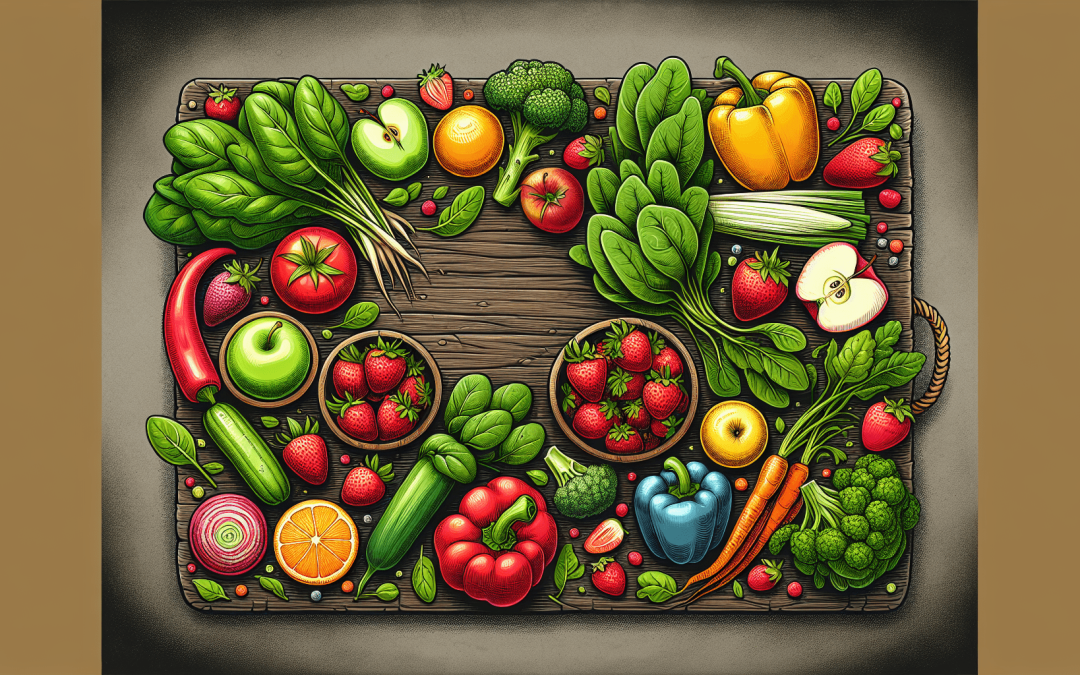Introduction
Are you looking to improve your health and overall well-being with organic nutrition, but not sure where to start? In this article, you will discover 10 easy tips to help you incorporate organic nutrition into your lifestyle as a beginner. From understanding the benefits of organic food to practical tips on how to make the switch, this guide will set you on the right path to a healthier you.
Benefits of Organic Nutrition
Eating organic food has many benefits for both your health and the environment. Organic produce is grown without synthetic pesticides, herbicides, or GMOs, making them safer for consumption. In addition, organic farming practices help conserve soil and water, reduce pollution, and support biodiversity. By choosing organic, you are not only nourishing your body but also supporting sustainable and ethical agricultural practices.
Improved Nutrient Content
Organic fruits, vegetables, and grains are often richer in essential vitamins, minerals, and antioxidants compared to conventionally grown produce. Studies have shown that organic crops contain higher levels of nutrients such as Vitamin C, iron, magnesium, and phosphorus. By choosing organic, you can maximize the nutritional benefits of your food and support your overall health and well-being.
Reduced Exposure to Harmful Chemicals
Conventional agriculture relies heavily on synthetic pesticides and herbicides to control pests and weeds. These chemicals can leave residues on food and have been linked to various health issues, including hormone disruption, reproductive problems, and even cancer. By choosing organic, you can minimize your exposure to these harmful chemicals and reduce the risk of potential health hazards.

Tips for Incorporating Organic Nutrition
Making the switch to organic nutrition doesn’t have to be intimidating. Here are 10 easy tips to help you get started on your journey to a healthier lifestyle:
1. Start with the Dirty Dozen
The Environmental Working Group (EWG) publishes an annual list of the “Dirty Dozen,” which consists of the fruits and vegetables with the highest pesticide residue levels. When shopping for produce, prioritize buying organic versions of these items to reduce your exposure to harmful chemicals. Some examples of the Dirty Dozen include strawberries, spinach, apples, and bell peppers.
2. Shop at Farmers’ Markets
Farmers’ markets are a great place to find fresh, locally grown organic produce. By shopping at farmers’ markets, you can directly support small-scale farmers in your community and have access to a wider variety of fruits and vegetables. Many farmers’ markets also offer organic meat, dairy, and pantry staples, allowing you to shop for all your organic nutrition needs in one place.
3. Join a Community Supported Agriculture (CSA) Program
Community Supported Agriculture (CSA) programs are another excellent way to source organic produce directly from local farmers. By joining a CSA, you can receive a weekly or monthly box of seasonal fruits and vegetables straight from the farm. This not only ensures that you have access to fresh, organic produce but also helps you develop a closer connection to where your food comes from.
4. Grow Your Own Organic Garden
If you have space and resources, consider starting your own organic garden. Growing your own fruits, vegetables, and herbs allows you to have complete control over the quality of your food and enjoy the satisfaction of harvesting your own produce. Organic gardening is also a great way to engage with nature, reduce your carbon footprint, and save money on grocery bills.
5. Read Labels Carefully
When shopping for packaged foods, be sure to read the labels carefully to identify organic products. Look for certifications such as the USDA Organic seal, which guarantees that the product meets strict organic standards. Additionally, familiarize yourself with common organic labeling terms such as “100% organic,” “organic,” and “made with organic ingredients” to make informed choices about the food you put into your body.
6. Cook Meals from Scratch
One of the best ways to ensure that your meals are organic and nutritious is to cook them from scratch. By preparing your own meals, you can control the ingredients you use and avoid processed foods that may contain unhealthy additives. Experiment with organic recipes, fresh herbs, and whole ingredients to create delicious and wholesome meals that support your health and well-being.
7. Opt for Organic Meat and Dairy
When it comes to animal products, choosing organic sources is crucial for both your health and the welfare of animals. Organic meat and dairy products come from animals raised without antibiotics, hormones, or synthetic pesticides. Look for labels such as “USDA Organic” or “Certified Organic” when purchasing meat, poultry, eggs, and dairy to ensure that you are supporting sustainable and ethical farming practices.
8. Swap Out Sugary Drinks for Organic Options
Many conventional beverages on the market are loaded with sugar, artificial flavors, and preservatives that can have negative effects on your health. Instead of reaching for sugary sodas or energy drinks, opt for organic alternatives such as herbal teas, coconut water, kombucha, or organic fruit juices. These options provide hydration and flavor without the harmful additives found in sugary drinks.
9. Plan Your Meals in Advance
Meal planning is an essential tool for maintaining a healthy and organic diet. By planning your meals in advance, you can ensure that you have a variety of nutritious options on hand and avoid the temptation of fast food or unhealthy snacks. Take the time to create a weekly meal plan, make a shopping list, and prep ingredients in advance to set yourself up for success in incorporating organic nutrition into your daily routine.
10. Gradually Transition to Organic
Making the switch to organic nutrition is a journey, not a sprint. Instead of trying to overhaul your entire diet overnight, start by making small, manageable changes each week. Whether it’s swapping out conventional produce for organic versions, trying new organic recipes, or incorporating more plant-based meals into your diet, every step towards organic nutrition is a step towards a healthier you.
Conclusion
Embarking on your organic nutrition journey as a beginner can feel overwhelming, but with these 10 easy tips, you can take small steps towards a healthier lifestyle. By understanding the benefits of organic food, incorporating organic produce into your meals, and making informed choices about the food you consume, you can support your health, the environment, and sustainable agriculture. Remember, every bite you take is an opportunity to nourish your body and make a positive impact on the world around you. Happy eating!
Related Content
- Best Organic Superfood in Monroeton North Carolina
- Best Organic Herbal Supplement in Turnbull Mississippi
- The Ultimate 2025 Guide to 10 Effective Organic Vitamins From Food That Boost Your Health
- Achieve Optimal Wellness through Whole Food Nutrition
- Why Organic Grains Are Better for Regulating Blood Sugar








